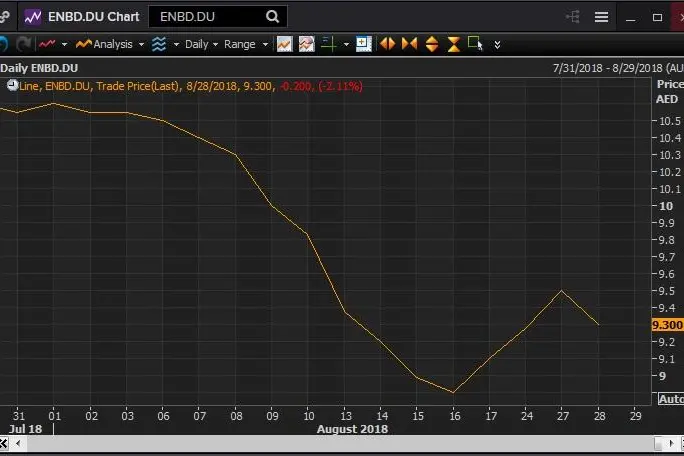PHOTO
One of the most affected stocks by the drop in the Turkish lira on the Dubai stock market is Emirates NBD, as concerns about its Turkey exposure has triggered a sell-off of its shares during August.
The stock has dropped 11.85 percent so far this month as investors exercised caution about its potential exposure to the market - the bank announced a deal in May to buy Turkey's Denizbank in a $3.2 billion deal.
The Turkish lira (TRY) tumbled nearly 5 percent against the dollar on Monday, closing at 6.1200 after a week-long holiday, hit by persistent concern about a diplomatic rift with Washington over a U.S. pastor on trial in Turkey.
On Tuesday, at 0435 GMT, the lira dropped again and stood at 6.1750 against the dollar. Emirate’s NBD’s stock fell by a further 2.11 percent on Tuesday as the Turkish Lira fell.
“The stock ended up lower today likely due to the weakness in TRY. The details of the exchange rate mechanism of the deal are not available, so there is a risk that the economics of the Denizbank acquisition becomes less favorable every time the TRY devalues against the USD,” EFG Hermes analyst Shabbir Malik told Zawya by email.
Emirates NBD, which is Dubai’s largest bank, said earlier this month that it was monitoring the situation in Turkey.
Arqaam Capital said in a note published on August 13 that “the fall in the TRY/USD might trigger a MAC (material adverse change) clause, creating the possibility of renegotiating the deal.”
The steep drop in the Turkish lira “could trigger a material adverse change (MAC) clause, which we expect to be part of the agreement, even though there was a mechanism in place to reduce the USD acquisition price in case of a depreciation of TRY/USD,” the note said.
It added that there was a possibility of Emirates NBD walking away from the deal. “We would not be surprised if ENBD would walk away from the deal even if it would trigger a penalty clause (< 2% of ENBD’s market cap), given evolving events in Turkey and a looming financial crisis.”
Dubai’s stock market ended 0.41 percent lower on Tuesday, while Abu Dhabi’s index added 0.36 percent, Qatar’s index added 0.57 percent, Bahrain’s index was mainly flat, Oman’s index added 0.65 percent and Kuwait’s index dropped 0.7 percent.
By 10:50 GMT, Saudi Arabia’s index was trading 0.25 percent higher, while Egypt’s index was the best performer in the region trading at 2.51 percent higher.
(Reporting by Gerard Aoun; Editing by Michael Fahy)
(gerard.aoun@thomsonreuters.com)
Our Standards: The Thomson Reuters Trust Principles
Disclaimer: This article is provided for informational purposes only. The content does not provide tax, legal or investment advice or opinion regarding the suitability, value or profitability of any particular security, portfolio or investment strategy. Read our full disclaimer policy here.
© ZAWYA 2018





















